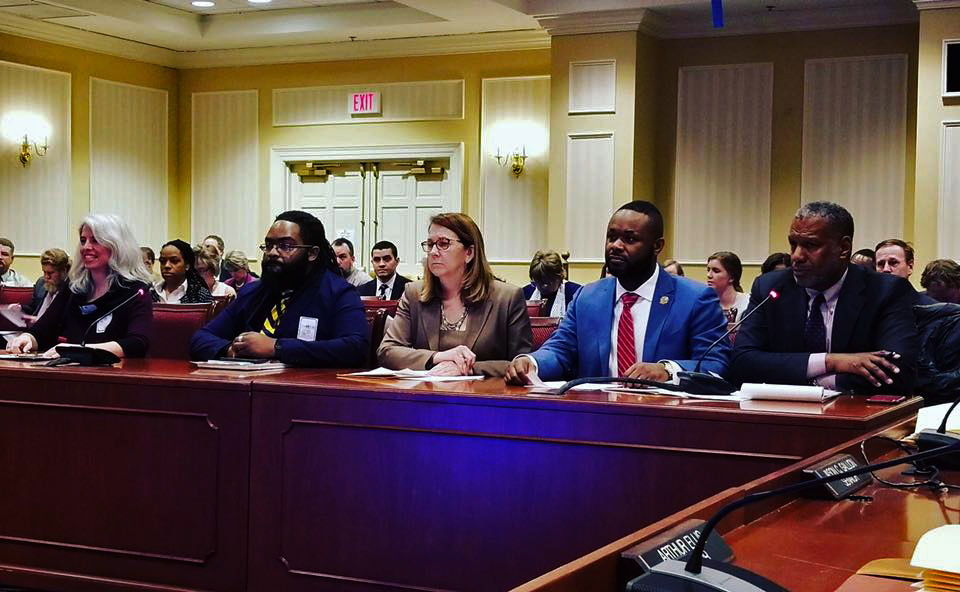A bill raising the minimum wage to $15 an hour by 2025 passed the Maryland House of Delegates and Senate this week and awaits the approval of Maryland Gov. Larry Hogan (R).
The proposed legislation intends to raise the minimum wage initially to $12.50 from the current $10.10 by 2022, and later increase the wage to $15 by 2025.

The initial bills, sponsored by Del. Diana Fennell (D-Prince George’s) in the Maryland House and Sen. Cory McCray (D-Baltimore City) in the Maryland Senate respectively, were resolved into a single bill after the convention of a conference committee. The resolved House bill passed in the Maryland House 96-44 on March 1 and in the Maryland Senate 32-15 on March 14.
Before voting on final passage of the bill, both chambers voted on several different amendments to the legislation. Amendments ranged from making geographical tiers for implementation of the bill to easing requirements for small businesses. In the end, none of the proposed amendments were adopted, according to The Washington Post.
An increase in the minimum wage will help local workers support themselves and their families, but may pose difficulties for small businesses, according to Maryland resident and Georgetown student Zahraa Hotait (NHS ’22). Policymakers should work to strike a balance between the interests of business owners and Maryland employees, Hotait said.
“I worked in a restaurant throughout high school and witnessed many of the hardworking servers struggling to support themselves or their families, even while holding multiple jobs,” Hotait wrote in a statement to The Hoya. “However, the community where I live in Maryland deeply values its small town cafés and independent shops, and it may be difficult for these establishments to survive at such a significant increase in wages for their staff.”
The bill’s passage in both chambers also came after negotiations with Hogan (R), who wants to raise the minimum wage to just $12.10 by 2022, according to the Washington Post.
In a letter to the Maryland House Speaker Michael E. Busch (D-Anne Arundel) and Senate President Thomas V. Mike Miller Jr. (D-Calvert), Hogan asked to delay the measure past 2022 in order to allow the neighboring states to increase their minimum wages and offset Maryland losses if the bill were to be enacted, according to The Washington Post.
Critics of the bill, along with Hogan, argue that the increase in the minimum wage would reduce Maryland’s competitiveness with surrounding states, according to Capital News Service, a University of Maryland College Park news agency. Currently, both Virginia and Pennsylvania have $7.25 minimum wages and West Virginia and Delaware have $8.75 minimum wages. In contrast to its neighbors, Washington, D.C., has a minimum wage of $13.25, though the minimum wage is supposed to rise to $14 on July 1, 2019, and again to $15 in 2020.
Despite Hogan’s request to wait for the surrounding states to meet a combined 80 percent of Maryland’s wage to implement the second phase of the bill, both chambers of Maryland’s state government passed the measure.
Hogan’s stance on the bill’s current form and whether he intends to veto it remain unclear. Democrats do, however, hold enough seats in both chambers to override a veto, should Hogan decide to reject the legislation. Under Maryland’s constitution, Hogan has 30 days to choose to veto the legislation, or the bill will be implemented.
Roughly two out of three Marylanders wanted to raise the minimum wage to $15, according to a recent Goucher College poll. The same poll also found a majority of Maryland voters supported legalizing marijuana recreationally, raising the minimum age for tobacco sales to 21, banning the use of styrofoam in the state and passing the proposed “aid-in-dying” legislation.
The push to increase minimum wage comes amid other progressive policies in Maryland chambers, such as legalizing recreational marijuana and banning 3D printed guns, as Democrats were able to increase their majorities in both chambers in the most recent elections in 2018, according to The Baltimore Sun.
Maryland’s efforts to raise the minimum wage comes after D.C. Mayor Muriel Bowser’s (D) push to raise the minimum wage to $15 in 2016. Critics of Bowser’s proposal cited the complicated system of wages for employees who receive tips in the District. Despite these criticisms, the District passed legislation to raise their minimum wage to $15 by 2020.
If implemented, Maryland would join a growing number of states who have recently raised their minimum wages to $15. In addition to D.C., California, Massachusetts and New York all have measures to raise their minimum wages by 2022, 2023 and 2021, respectively.




















